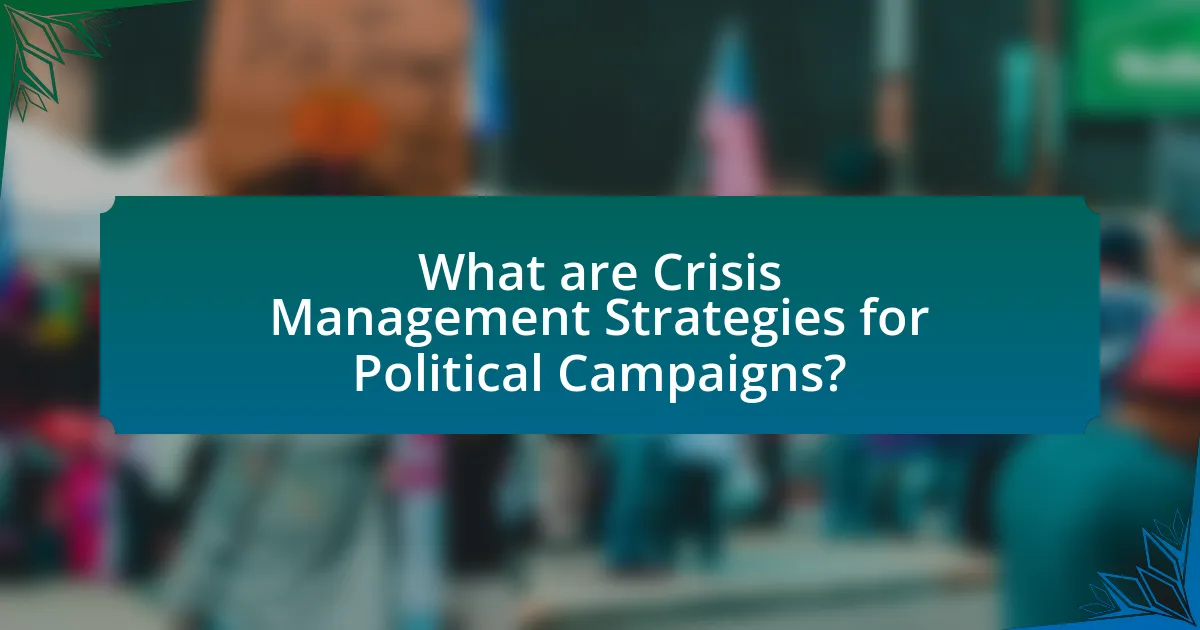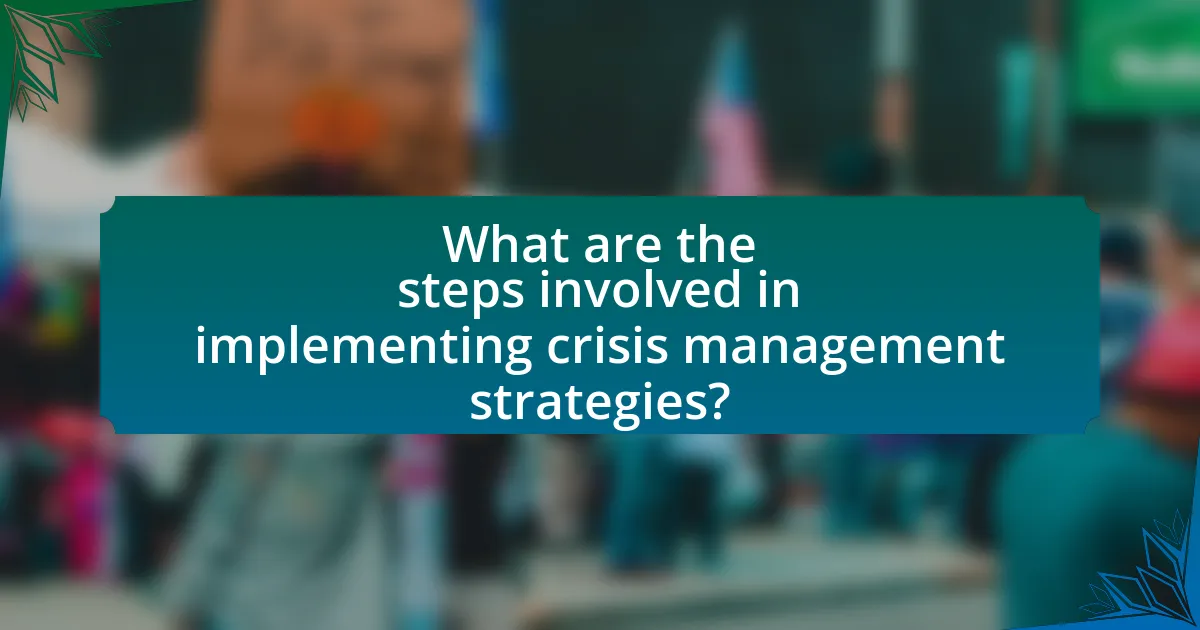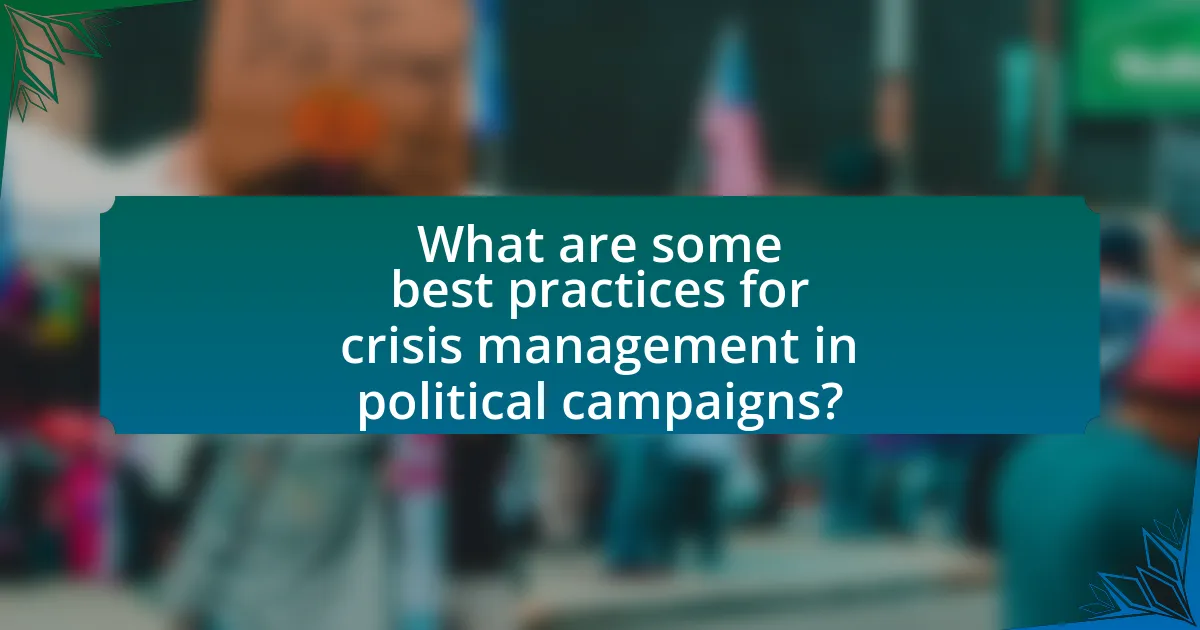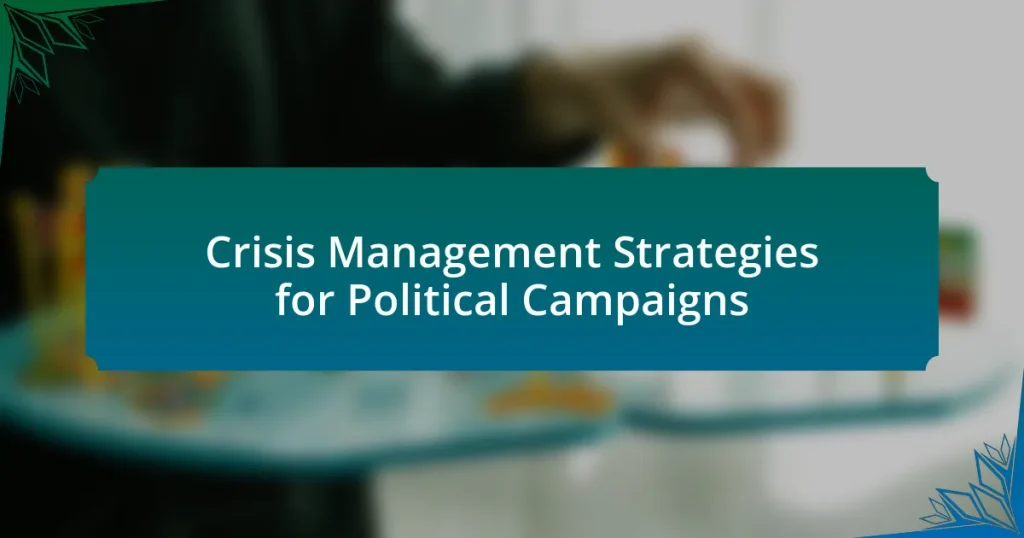Crisis management strategies for political campaigns are essential for maintaining public trust and mitigating damage to a candidate’s reputation during unforeseen events. Key components include proactive communication, rapid response teams, and stakeholder engagement, which help campaigns address potential crises effectively. The article outlines various types of crises that can arise, such as scandals and communication failures, and emphasizes the importance of preparation, training, and evaluation in crisis management. Additionally, it discusses the role of social media in crisis communication and provides best practices for political campaigns to enhance their crisis management strategies.

What are Crisis Management Strategies for Political Campaigns?
Crisis management strategies for political campaigns include proactive communication, rapid response teams, and stakeholder engagement. Proactive communication involves anticipating potential issues and addressing them before they escalate, which helps maintain public trust. Rapid response teams are essential for quickly addressing crises as they arise, ensuring that accurate information is disseminated to counter misinformation. Stakeholder engagement focuses on maintaining open lines of communication with key supporters, media, and the public to foster transparency and trust. These strategies are supported by historical examples, such as Barack Obama’s 2008 campaign, which effectively utilized social media to manage crises and communicate directly with voters, demonstrating the importance of timely and transparent communication in political contexts.
Why is crisis management essential in political campaigns?
Crisis management is essential in political campaigns because it helps mitigate damage to a candidate’s reputation and maintains public trust during unforeseen events. Effective crisis management allows campaigns to respond swiftly and strategically to negative situations, thereby controlling the narrative and minimizing potential fallout. For instance, during the 2008 U.S. presidential election, Barack Obama’s campaign effectively managed the controversy surrounding his pastor, Reverend Jeremiah Wright, by addressing the issue directly and reframing the conversation, which ultimately helped preserve his candidacy. This demonstrates that proactive crisis management can significantly influence public perception and electoral outcomes.
What types of crises can political campaigns face?
Political campaigns can face several types of crises, including scandals, financial issues, communication failures, and external threats. Scandals often arise from candidate behavior or past actions, which can damage public perception and trust. Financial issues may involve mismanagement of funds or unexpected expenses that threaten campaign viability. Communication failures can occur when messages are misinterpreted or poorly delivered, leading to public backlash. External threats, such as cyberattacks or misinformation campaigns, can undermine a campaign’s integrity and effectiveness. Each of these crises can significantly impact a campaign’s success and requires strategic management to mitigate their effects.
How can crises impact a political campaign’s success?
Crises can significantly undermine a political campaign’s success by eroding public trust and diverting attention from key messages. For instance, during the 2016 U.S. presidential election, controversies surrounding candidate Hillary Clinton’s email practices shifted voter focus away from her policy proposals, negatively impacting her campaign. Additionally, crises can create opportunities for opponents to capitalize on vulnerabilities, as seen when Donald Trump leveraged Clinton’s email scandal to question her integrity. Effective crisis management, therefore, is crucial; campaigns that respond swiftly and transparently can mitigate damage and potentially regain public confidence.
What are the key components of effective crisis management strategies?
The key components of effective crisis management strategies include preparation, communication, response, and evaluation. Preparation involves developing a crisis management plan that outlines potential risks and responses, ensuring that the team is trained and ready to act. Communication is critical; it requires timely and transparent messaging to stakeholders, including the public and media, to maintain trust and credibility. The response component focuses on executing the crisis management plan effectively, addressing the issue at hand while minimizing damage. Finally, evaluation entails reviewing the crisis response to identify lessons learned and improve future strategies. Research indicates that organizations with a well-defined crisis management plan are 50% more likely to recover quickly from a crisis, highlighting the importance of these components.
How do communication plans play a role in crisis management?
Communication plans are essential in crisis management as they provide a structured approach to disseminating information and managing stakeholder perceptions during a crisis. Effective communication plans outline key messages, target audiences, and communication channels, ensuring that accurate information reaches the public and stakeholders promptly. For instance, during the 2008 financial crisis, organizations that implemented clear communication strategies were able to maintain trust and mitigate reputational damage by providing timely updates and addressing concerns directly. This demonstrates that well-crafted communication plans can significantly influence the outcome of a crisis by fostering transparency and accountability.
What role does team training have in crisis preparedness?
Team training plays a crucial role in crisis preparedness by enhancing communication, coordination, and decision-making among team members. Effective training equips individuals with the skills to respond swiftly and efficiently during a crisis, minimizing potential damage. Research indicates that organizations with well-trained teams experience a 30% reduction in response time during emergencies, demonstrating the tangible benefits of structured training programs. Furthermore, simulations and role-playing exercises during training foster a deeper understanding of crisis scenarios, enabling teams to develop strategic responses tailored to specific challenges.
How can political campaigns identify potential crises before they occur?
Political campaigns can identify potential crises before they occur by implementing proactive monitoring and analysis of public sentiment and media coverage. This involves utilizing tools such as social media analytics, sentiment analysis software, and traditional media monitoring to detect emerging issues or negative trends. For instance, a study by the Pew Research Center found that 72% of Americans use social media, making it a critical platform for gauging public opinion and potential backlash. By analyzing data from these sources, campaigns can anticipate crises and develop strategies to address them before they escalate.
What tools and techniques can be used for crisis forecasting?
Crisis forecasting can be effectively conducted using tools and techniques such as predictive analytics, scenario planning, and social media monitoring. Predictive analytics utilizes historical data and statistical algorithms to identify potential crisis patterns, enabling campaigns to anticipate issues before they escalate. Scenario planning involves creating detailed narratives about possible future events, allowing teams to prepare responses for various crisis situations. Social media monitoring tools track public sentiment and emerging trends in real-time, providing insights into potential crises based on audience reactions. These methods have been validated in various political contexts, demonstrating their effectiveness in preemptively addressing crises.
How can stakeholder analysis help in crisis prevention?
Stakeholder analysis can significantly aid in crisis prevention by identifying key individuals and groups that influence or are affected by a political campaign. By understanding their interests, concerns, and potential impact, campaign managers can proactively address issues before they escalate into crises. For instance, a study by the Harvard Kennedy School highlights that campaigns that engage stakeholders early and often can mitigate risks associated with public backlash or misinformation. This proactive engagement allows for tailored communication strategies that align with stakeholder expectations, ultimately reducing the likelihood of crises arising from misunderstandings or unmet needs.

What are the steps involved in implementing crisis management strategies?
The steps involved in implementing crisis management strategies include identifying potential crises, developing a crisis management plan, establishing a crisis communication team, training staff, and conducting simulations. Identifying potential crises involves assessing vulnerabilities specific to the political campaign, such as public relations issues or candidate controversies. Developing a crisis management plan outlines procedures for responding to various scenarios, ensuring that all team members understand their roles. Establishing a crisis communication team ensures that there is a dedicated group responsible for managing communications during a crisis, which is crucial for maintaining public trust. Training staff prepares them to respond effectively under pressure, while conducting simulations tests the plan and identifies areas for improvement. These steps are essential for minimizing damage and maintaining the integrity of the political campaign during a crisis.
How should a political campaign respond to a crisis once it occurs?
A political campaign should respond to a crisis by implementing a clear communication strategy that addresses the issue promptly and transparently. This involves quickly gathering accurate information about the crisis, assessing its impact, and formulating a response that aligns with the campaign’s values and objectives. For instance, during the 2008 presidential campaign, Barack Obama’s team effectively managed a crisis related to controversial remarks made by his pastor by swiftly addressing the issue in a public speech, which helped to mitigate potential damage to his candidacy. This approach demonstrates the importance of timely and honest communication in maintaining public trust and credibility during a crisis.
What immediate actions should be taken during a crisis?
During a crisis, the immediate actions that should be taken include assessing the situation, communicating transparently, and mobilizing the crisis management team. Assessing the situation involves gathering accurate information to understand the scope and impact of the crisis. Transparent communication is crucial to maintain trust; this includes informing stakeholders and the public about the situation and the steps being taken. Mobilizing the crisis management team ensures that a coordinated response is implemented quickly, leveraging expertise to address the crisis effectively. These actions are supported by the fact that timely and clear communication can mitigate reputational damage, as evidenced by studies showing that organizations that respond swiftly to crises can recover more effectively.
How can campaigns maintain transparency during a crisis?
Campaigns can maintain transparency during a crisis by providing timely and accurate information to the public. This involves regularly updating stakeholders through press releases, social media, and direct communication channels to clarify the situation and the campaign’s response. For instance, during the COVID-19 pandemic, political campaigns that openly shared their safety protocols and changes in campaign strategies were able to build trust with voters. Transparency fosters credibility, as seen in studies indicating that clear communication during crises can enhance public confidence in leadership.
What role does social media play in crisis management for political campaigns?
Social media serves as a critical tool in crisis management for political campaigns by enabling rapid communication and real-time engagement with the electorate. During a crisis, political campaigns utilize platforms like Twitter and Facebook to disseminate information quickly, counter misinformation, and shape public perception. For instance, a study by the Pew Research Center found that 69% of adults in the U.S. use social media, making it an effective channel for reaching a large audience swiftly. Additionally, social media allows campaigns to monitor public sentiment and respond to emerging issues, thereby mitigating potential damage to their reputation. This proactive engagement can significantly influence voter opinions and maintain campaign momentum during challenging times.
How can campaigns effectively use social media to communicate during a crisis?
Campaigns can effectively use social media to communicate during a crisis by providing timely, transparent, and accurate information to their audience. This approach ensures that the campaign addresses concerns directly and mitigates misinformation. For instance, during the COVID-19 pandemic, political campaigns that utilized platforms like Twitter and Facebook to share real-time updates and safety guidelines saw increased engagement and trust from their followers. Research from the Pew Research Center indicates that 53% of Americans reported using social media for news during the pandemic, highlighting its role as a critical communication tool in crises. By actively engaging with constituents, responding to inquiries, and correcting false narratives, campaigns can maintain credibility and foster a sense of community during challenging times.
What are the risks of social media during a political crisis?
The risks of social media during a political crisis include the rapid spread of misinformation, heightened polarization, and the potential for inciting violence. Misinformation can quickly go viral, leading to public confusion and misinformed decision-making, as seen during the 2016 U.S. presidential election when false narratives proliferated online. Heightened polarization occurs as social media algorithms often reinforce existing beliefs, creating echo chambers that exacerbate divisions among the populace. Additionally, social media can serve as a platform for organizing violent protests or riots, as evidenced by the events surrounding the Capitol riots in January 2021, where social media played a crucial role in mobilizing participants.
How can campaigns evaluate the effectiveness of their crisis management strategies?
Campaigns can evaluate the effectiveness of their crisis management strategies by analyzing key performance indicators (KPIs) such as public sentiment, media coverage, and voter response. For instance, tracking changes in public opinion through surveys before and after a crisis can reveal how well the strategy resonated with constituents. Additionally, monitoring media sentiment and the volume of coverage can indicate whether the campaign successfully controlled the narrative. A study by the Pew Research Center found that campaigns that actively engage with media during a crisis can mitigate negative perceptions, demonstrating the importance of strategic communication. Furthermore, assessing voter turnout and engagement metrics post-crisis can provide insights into the overall impact of the crisis management efforts on campaign support.
What metrics should be used to assess crisis response success?
To assess crisis response success, key metrics include response time, stakeholder engagement, message consistency, and public sentiment analysis. Response time measures how quickly a campaign addresses the crisis, with faster responses typically correlating with better outcomes. Stakeholder engagement evaluates the effectiveness of communication with key audiences, such as voters and media, ensuring that messages reach and resonate with them. Message consistency assesses whether the campaign maintains a unified narrative throughout the crisis, which is crucial for credibility. Public sentiment analysis gauges the overall perception of the campaign during and after the crisis, often using social media monitoring tools to track changes in public opinion. These metrics collectively provide a comprehensive view of a campaign’s crisis management effectiveness.
How can lessons learned from a crisis improve future strategies?
Lessons learned from a crisis can significantly enhance future strategies by providing critical insights into vulnerabilities and effective responses. Analyzing past crises allows political campaigns to identify what went wrong, understand public perception, and develop contingency plans. For instance, the 2008 financial crisis prompted political campaigns to adopt more transparent communication strategies, as candidates learned that voters value honesty during turbulent times. This shift in approach has been supported by studies showing that transparency can increase voter trust and engagement. By integrating these lessons, campaigns can create more resilient strategies that are better equipped to handle unforeseen challenges.

What are some best practices for crisis management in political campaigns?
Best practices for crisis management in political campaigns include establishing a crisis communication plan, maintaining transparency, and responding quickly to emerging issues. A crisis communication plan outlines procedures for addressing potential crises, ensuring that all team members know their roles and responsibilities. Transparency builds trust with the public, as seen in the 2008 Obama campaign, which effectively communicated during controversies. Quick responses are crucial; research indicates that timely communication can mitigate damage, as demonstrated by the swift handling of the 2016 Clinton email controversy, which aimed to control the narrative.
How can political campaigns prepare for potential crises in advance?
Political campaigns can prepare for potential crises in advance by developing a comprehensive crisis management plan that includes risk assessment, communication strategies, and training for staff. A thorough risk assessment identifies vulnerabilities and potential crises that could arise during the campaign, allowing teams to prioritize and address these issues proactively. Effective communication strategies, including pre-drafted statements and designated spokespersons, ensure that the campaign can respond quickly and consistently to any crisis. Training staff on crisis protocols and conducting simulation exercises enhances readiness and ensures that all team members understand their roles during a crisis. Historical examples, such as the swift response of Barack Obama’s campaign to misinformation in 2008, demonstrate the effectiveness of these strategies in mitigating damage and maintaining public trust.
What training programs are effective for crisis management preparation?
Effective training programs for crisis management preparation include simulation-based training, tabletop exercises, and scenario planning workshops. Simulation-based training immerses participants in realistic crisis scenarios, enhancing decision-making skills under pressure. Tabletop exercises facilitate discussion and strategy development among team members, allowing them to explore responses to potential crises in a controlled environment. Scenario planning workshops encourage teams to anticipate various crisis situations and develop tailored response strategies. Research indicates that organizations employing these training methods experience improved crisis response times and more effective communication during actual crises, as evidenced by studies conducted by the Harvard Business Review and the International Association of Emergency Managers.
How can simulations help in crisis management training?
Simulations enhance crisis management training by providing realistic, immersive scenarios that allow participants to practice decision-making under pressure. These simulations replicate high-stakes environments, enabling trainees to experience the dynamics of a crisis without real-world consequences. Research indicates that experiential learning through simulations significantly improves retention of crisis management skills, as evidenced by a study published in the Journal of Business Continuity & Emergency Planning, which found that participants in simulation-based training demonstrated a 30% increase in effective response strategies compared to traditional training methods. This hands-on approach fosters teamwork, communication, and strategic thinking, essential components for effective crisis management in political campaigns.
What common mistakes should political campaigns avoid during a crisis?
Political campaigns should avoid several common mistakes during a crisis, including lack of timely communication, failure to acknowledge the issue, and inconsistent messaging. Timely communication is crucial; delays can lead to speculation and misinformation, as seen in the 2016 U.S. presidential election when candidates faced backlash for not addressing controversies promptly. Acknowledging the issue demonstrates transparency and accountability, which is vital for maintaining public trust. Inconsistent messaging can confuse voters and damage credibility, as evidenced by various campaigns that struggled to maintain a unified stance during crises. These mistakes can significantly hinder a campaign’s ability to navigate challenging situations effectively.
How can overreacting to a crisis damage a campaign’s reputation?
Overreacting to a crisis can significantly damage a campaign’s reputation by creating an impression of instability and lack of control. When a campaign responds excessively to a situation, it may lead to public perception that the campaign is panicking, which can erode trust among supporters and potential voters. For instance, a study by the Pew Research Center found that 70% of voters are influenced by a candidate’s ability to handle crises effectively. If a campaign appears to overreact, it may trigger negative media coverage, amplify the crisis, and distract from the campaign’s core messages, ultimately harming its credibility and public image.
What are the consequences of poor communication during a crisis?
Poor communication during a crisis can lead to misinformation, loss of public trust, and ineffective response strategies. Misinformation can spread rapidly, causing confusion among stakeholders and the public, which can exacerbate the crisis. For instance, during the 2010 BP oil spill, unclear messaging contributed to public outrage and distrust in the company. Loss of public trust can result in long-term damage to a political campaign’s reputation, as seen in various political scandals where miscommunication led to voter disillusionment. Ineffective response strategies can hinder the ability to manage the crisis effectively, resulting in prolonged negative impacts on the campaign’s image and voter support.
What practical tips can enhance crisis management strategies for political campaigns?
To enhance crisis management strategies for political campaigns, establish a proactive communication plan that includes rapid response protocols. This plan should outline specific roles and responsibilities for team members, ensuring that everyone knows their tasks during a crisis. Additionally, conduct regular training simulations to prepare the team for potential scenarios, which can improve response times and effectiveness. Research indicates that campaigns with structured crisis management plans are 30% more likely to maintain public trust during controversies. Furthermore, utilizing social media monitoring tools can help identify emerging issues before they escalate, allowing for timely interventions.


